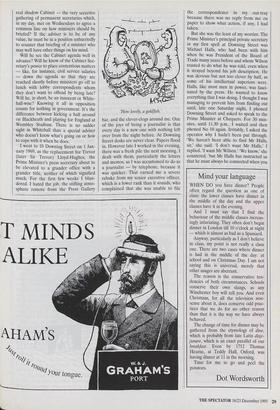Mind your language
WHEN DO you have dinner? People often regard the question as one of class: the lower classes have dinner in the middle of the day and the upper classes have it in the evening.
And I must say that I fmd the behaviour of the middle classes increas- ingly infuriating. They often don't begin dinner in London till 10 o'clock at night — which is almost as bad as a Spaniard.
Anyway, particularly as I don't believe in class, my point is not really a class one. There arc two cases where dinner is had in the middle of the day: at school and on Christmas Day. I am not saying this is universal, merely that other usages are aberrant.
The reason is the conservative ten- dencies of both circumstances. Schools conserve their own slangs, as any Winchester boy will tell you. And even Christmas, for all the television non- sense about it, does conserve odd prac- tices that we do for no other reason than that it is the way we have always behaved.
The change of time for dinner may be gathered from the etymology of dine, which is probably from late Latin disje- junare, which is an exact parallel of our breakfast. Even by 1712 Thomas Hearne, at Teddy Hall, Oxford, was having dinner at 11 in the morning.
Time for me to go and peel the potatoes.










































































































 Previous page
Previous page